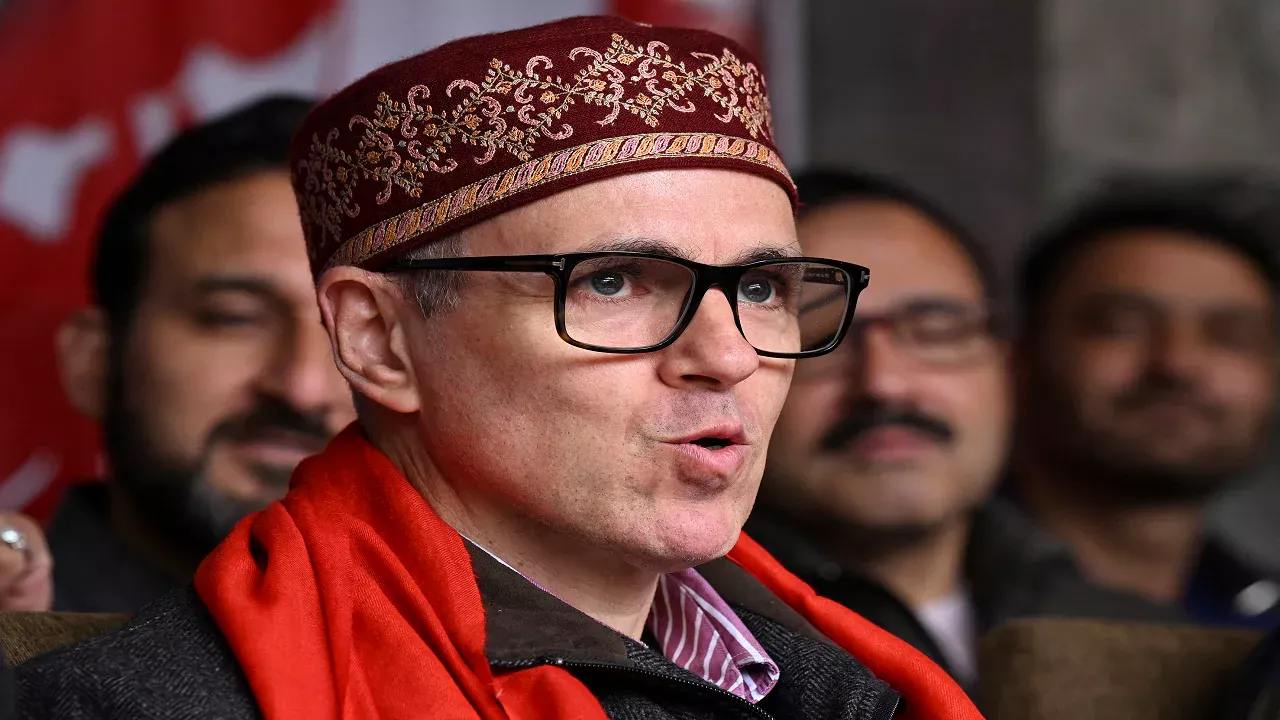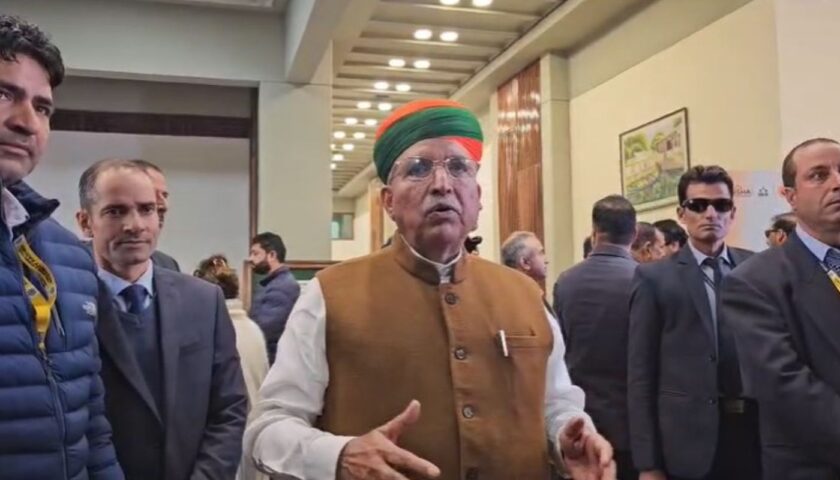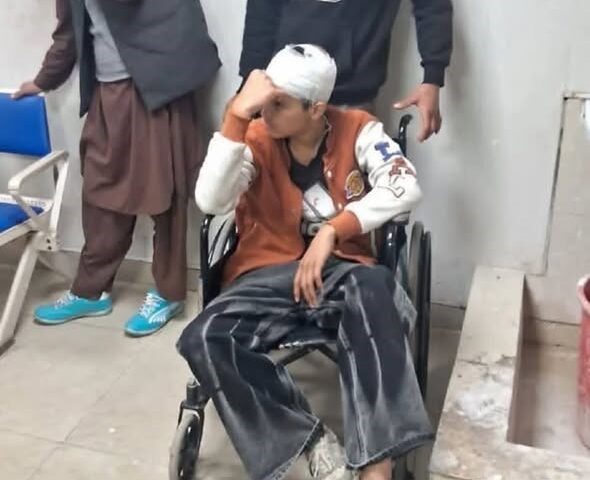Omar Abdullah Rejects Religion-Based Admissions in Vaishno Devi Medical College Row
By: Javid Amin | 26 November 2025
A Controversy at the Crossroads of Merit, Religion, and Politics
A fresh political storm has engulfed Jammu & Kashmir after demands surfaced for religion-based admissions at the Shri Mata Vaishno Devi Institute of Medical Excellence, a newly established medical institution funded by the shrine board. What began as a student admission dispute soon escalated into a constitutional and communal debate—fuelled by political parties, religious outfits, and public sentiments across Jammu and Kashmir.
On Constitution Day, J&K Chief Minister Omar Abdullah delivered a sharp rebuke to those seeking religious preferences in medical admissions. “Where will the Constitution go?” he asked, questioning the very idea of filtering educational opportunities through religious identity.
His remarks triggered an exchange of accusations, with the Bharatiya Janata Party (BJP) and affiliated groups alleging that the Chief Minister was “polarising” the region and “speaking only for Kashmir.”
At the heart of the controversy lies a set of difficult questions that India struggles with repeatedly:
Should religious identity influence public education? What does the Constitution say? How do politics shape social justice? And how do students, most importantly, navigate these pressures?
This article unpacks the issue in detail—its origins, political consequences, constitutional context, and impact on the youth of Jammu & Kashmir.
How the Vaishno Devi Admission Row Began
A Shrine-Funded College, a Merit List, and a Political Flashpoint
The Shri Mata Vaishno Devi Institute of Medical Excellence (SMVDIME), affiliated with the Shrine Board, opened its admissions based on NEET scores, following the standard all-India merit process.
But controversy erupted when the final list revealed that 42 of the 50 selected students were Muslims.
Various Hindu groups in Jammu protested, arguing that a college built using “shrine funds” should reflect “Hindu representation.” Some even demanded amendments to the Shrine Board Act to allow preferences based on religion.
The protests, largely symbolic at first, soon gained political traction.
The Central Trigger: Merit vs. Faith
The question of whether a publicly funded—yet shrine-linked—institution can adopt religion-based criteria divided opinions across the Union Territory.
Supporters of the protest argued:
-
The institution represents Vaishno Devi’s sacred identity.
-
Shrines should be empowered to preserve religious-cultural character.
-
High Muslim representation raises concerns of “imbalanced admissions.”
Opponents countered:
-
Public institutions using public funds cannot discriminate based on religion.
-
NEET merit is the only legal and constitutional basis for selection.
-
Religious quotas would set a dangerous precedent for Indian education.
This ideological tug-of-war set the stage for Omar Abdullah’s intervention.
Omar Abdullah’s Strong Response — “Where Will the Constitution Go?”
Constitution Day Message Becomes a Political Statement
Speaking on November 26, Constitution Day, Omar Abdullah linked the controversy to India’s founding principles. Describing the demands for religious quotas as “deeply disturbing,” he said:
“If admissions are decided by faith, where will the Constitution go? Where will equality go?”
He underscored several points:
1. Admissions Were Based Entirely on NEET Merit
The CM clarified that the selection process was transparent and constitutionally compliant.
The fact that 42 Muslims qualified was not a deliberate preference, but the natural outcome of merit rankings.
2. Religious Bias in Education Violates the Constitution
He argued that India’s Constitution, particularly Articles 14, 15, and 16, outrightly prohibits discrimination in publicly funded institutions.
3. Backlash Over Merit Reflects a Dangerous Trend
The Chief Minister warned that replacing merit with religious identity undermines institutional integrity, especially in medical education where competency directly affects public health.
A Symbolic Stand on Constitution Day
Omar Abdullah’s timing was deliberate. Constitution Day commemorates the adoption of the Indian Constitution in 1949. His remarks framed the controversy not merely as a political dispute, but as a test of India’s secular and democratic values.
BJP’s Counterattack — Accusations of “Polarisation”
Within hours of the Chief Minister’s statement, the BJP launched a sharp counteroffensive.
The BJP’s Charge Sheet Against Omar Abdullah
Senior BJP leaders alleged:
-
Omar Abdullah was “speaking only for Kashmir, not Jammu.”
-
He ignored the sentiments of Vaishno Devi devotees.
-
He was turning a legitimate community concern into a “communal debate.”
-
The NC government was “selectively secular” and biased toward Muslim students.
The BJP also argued that:
-
Hindus of Jammu feel underrepresented in the education system.
-
The Shrine Board’s religious character warrants “consideration of faith.”
-
The CM was using the controversy to “mobilise Kashmir-based support.”
Why the BJP Sees a Political Opportunity
The medical college row allowed the BJP to amplify themes that resonate strongly in Jammu:
-
Shrine autonomy and Hindu identity
-
Perceptions of bias against Jammu
-
Concerns over demographic patterns in higher education
-
Calls for policy correction based on “public sentiment”
The BJP’s narrative positions the party as a defender of Jammu’s religious identity, positioning Omar as a leader disconnected from grassroots anxieties.
The Constitutional Lens — What the Law Actually Says
Amid the heated political rhetoric, it is essential to examine the legal framework governing admissions.
1. Public Institutions Cannot Discriminate by Religion
Under Articles 14 and 15(1), the state cannot discriminate against any citizen based on religion, caste, or creed.
2. NEET Regulations Mandate a Single, Merit-Based Process
Since NEET became mandatory for all medical colleges, no state or institution—religious or otherwise—can deviate from the national merit list.
3. Shrine-Linked Institutions Still Fall Under Public Regulation
Although the Shrine Board manages the college, the institution is not a minority institution and therefore cannot impose religion-based preferences.
4. Past Court Rulings Strengthen the Case for Merit
Several Supreme Court judgments affirm that:
-
Professional education must prioritise merit.
-
Public funds cannot support religious discrimination.
-
Minority institutions must still uphold basic fairness.
Conclusion of the Legal Position
Nothing in Indian law permits religion-based admissions in a publicly governed medical institution.
This aligns with Omar Abdullah’s stance, even if it conflicts with some local sentiments.
Social and Political Undercurrents Behind the Protests
The controversy isn’t merely constitutional—it reveals deeper social anxieties and regional divisions.
1. Jammu vs Kashmir Polarisation
The issue has revived old tensions:
-
Jammu groups accuse Kashmir-centric parties of sidelining them.
-
Kashmir leaders accuse BJP of fuelling communal narratives.
2. Youth Discontent
Both Hindu and Muslim students fear the education system may become hostage to:
-
religious politics
-
regional identity
-
party agendas
3. The “Shrine Fund” Argument
Many protesters believe that funds donated by Hindu devotees should benefit Hindu youth.
However, constitutional rules view shrine funds as public trust assets, not religious entitlements.
4. Emotional Anchors
The Vaishno Devi shrine holds deep emotional significance in Jammu.
Any issue involving the shrine naturally triggers strong subjective reactions—political groups capitalise on this sensitivity.
What Happens If Religious Quotas Are Introduced?
Should the demands for religious-based admissions be met—something legally impossible—the consequences would be profound.
1. Precedent for Religious Admission in Other Sectors
This could open the door for similar demands in:
-
engineering colleges
-
nursing colleges
-
government recruitment
-
universities
-
medical PG admissions
2. Erosion of Secular Standards in Education
It would contradict decades of progress in professional education fairness.
3. Institutional Decline
Merit dilution risks producing:
-
underprepared doctors
-
credibility issues for the college
-
legal battles
-
accreditation challenges
4. Political Exploitation
Communal elements across the political spectrum could use this precedent to intensify identity-based mobilisation.
What Students Are Saying
Interviews and social media reactions highlight a growing sense of worry:
-
Hindu students fear “outsider dominance” in shrine-affiliated institutions.
-
Muslim students worry they may be demonised for performing well.
-
General category students fear political interference in merit lists.
-
Parents are concerned about stability in medical admissions.
Many say they want only one thing: a fair, transparent system free from political distortion.
The Broader Political Implications
1. BJP–NC Rivalry Intensifies
The controversy sharpens the ideological divide:
-
NC positions itself as guardian of constitutional secularism.
-
BJP positions itself as guardian of religious identity and Jammu’s interests.
2. Election Timing Matters
The issue emerges ahead of critical political phases:
-
Panchayat polls
-
Possible Assembly elections
-
NC–BJP clashes over governance
3. Narrative Building on Both Sides
Both parties are framing the issue to mobilise their respective voter bases.
What Happens Next? Possible Scenarios
Scenario 1: Merit List Retained (Most Likely)
Legally sound and widely expected.
Scenario 2: Political Pressure Forces Review
Highly unlikely, but would create instability.
Scenario 3: Legal Battle in High Court or Supreme Court
Some groups may approach courts—but the legal position heavily favours merit-based admissions.
Scenario 4: Larger Debate on Shrine Board Governance
Political leaders may revisit how shrine-managed institutions should function.
Conclusion: A Test of India’s Secular Commitment
The Vaishno Devi medical college controversy transcends a simple admission dispute. It touches upon:
-
the sanctity of the Constitution
-
the balance of religion and governance
-
the rights of students to fair opportunity
-
political competition in a sensitive UT
-
the emotional and cultural identities of communities
Omar Abdullah’s question—“Where will the Constitution go?”—captures the essence of the crisis. Whether one agrees with him or not, the debate forces India to confront a vital principle:
Public education belongs to merit, not religious identity.
For students in Jammu & Kashmir, the hope remains that political storms will not overshadow their dreams, and that the Constitution will—indeed—remain the guiding light.




